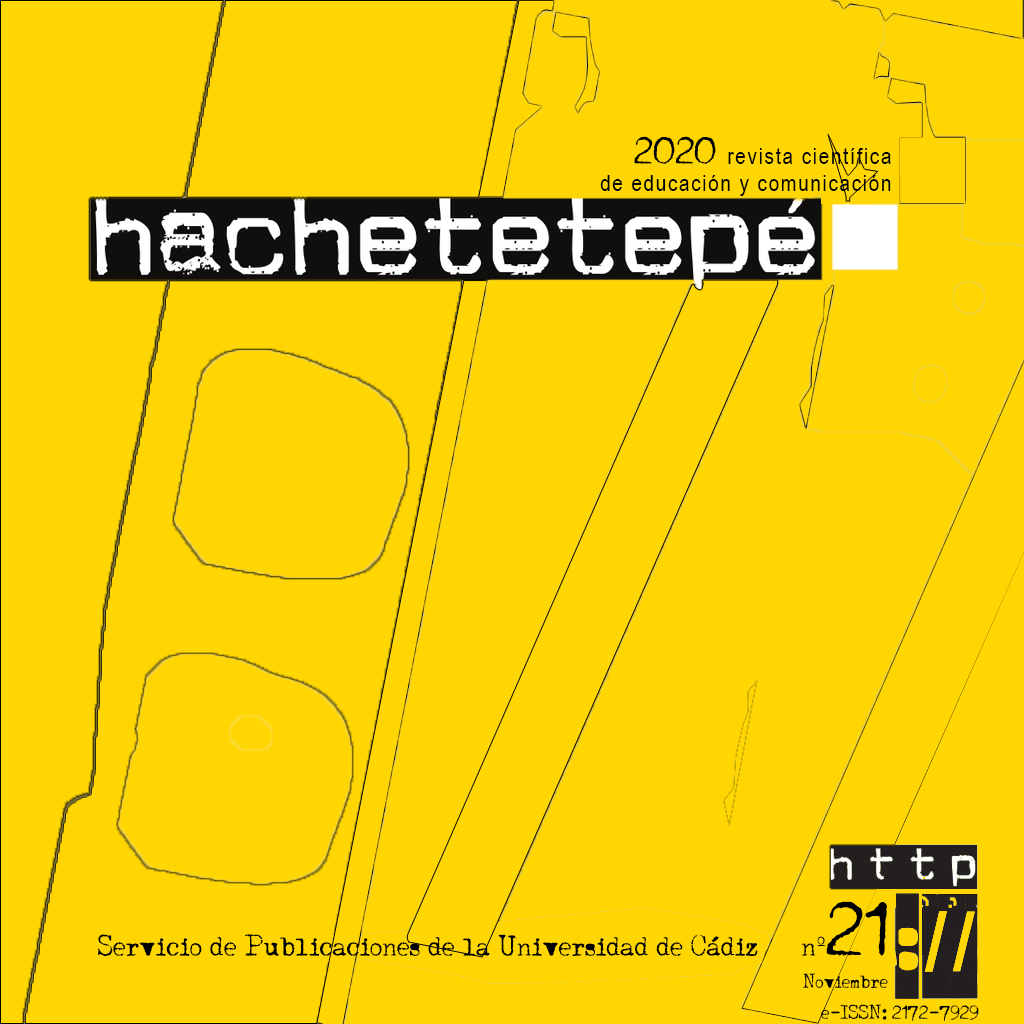The socio-educational project “Carnival at school”. The narrative of one of its creators

Downloads
DOI
https://doi.org/10.25267/Hachetetepe.2020.i21.8Info
Abstract
Through this research, the aim is to find out what were the motivations and claims for the creation of the socio-educational project "Carnival at School", which is carried out in the Primary Education centers of the city of Cádiz (Spain). In it, activities are carried out with the students in which different aspects and competencies of the primary curricular areas are worked on, having the Cádiz carnival as the backbone of the same. In this article the voice of one of its creators is captured, using the narrative methodology, where he tells his experience as a designer of the project and his vision of it throughout its fifteen years of existence. To justify it, aspects such as heritage education and theory on non-formal contexts are taken as a theoretical basis. The research also reflects the potential of the Cádiz Carnival as an educational agent in aspects such as education in values and with curricular possibilities.Keywords
Downloads
How to Cite
License
Copyright (c) 2020 Efraín Oliva Benítez

This work is licensed under a Creative Commons Attribution-NonCommercial-NoDerivatives 4.0 International License.
Those authors who have published with this journal, accept the following terms:
- They will retain their copyright and guarantee the journal the right to first publication of their work, which will simultaneously be subject to the Creative Commons Attribution License . They may be copied, used, disseminated, transmitted and publicly displayed, provided that the authorship, url, and magazine are cited, and are not used for commercial purposes. No derivative works are allowed.
- They may adopt other non-exclusive license agreements for the distribution of the published version of the work (e.g., deposit it in an institutional telematic archive or publish it in a monographic volume) provided that the initial publication in this journal is indicated.
- Disseminate your work through the Internet (e.g., in institutional telematic archives or on your website) once the manuscript is accepted, which may lead to interesting exchanges and increased citations of the published work. (See The effect of open access).
Hachetetepé. Scientific journal of education and communication does not charge a fee for the submission of manuscripts or for the publication of its articles.
References
Amar, V. M. (2014). Didáctica y comunicación no verbal. Salamanca: Comunicación Social.
Amar, V. M. (2018). Miradas y Voces de futuros maestros. Barcelona: Octaedro
Amar, V. M., Peláez, J.C. y Oliva, E. (2020). Desde la más tierna infancia. En V. Amar (coord.) Retos para la formación inicial: Desde las miradas y voces de docentes en activo (145-160). Barcelona: Octaedro.
Arévalo, A. (2009). Importancia del folklore musical como práctica educativa. Revista Electrónica de LEEME, 23, 1-14.
Arias, A. M., Alvarado, S. V. (2015). Investigación narrativa: apuesta metodológica para la construcción social de conocimientos científicos. Revista CES Psicología, 8(2), 171- 181.
Bassi, J. E. (2014). Hacer una historia de vida: decisiones clave durante el proceso de investigación. Athenea Digital, 14(3), 129-170. http://dx.doi.org/10.5565/rev/athenea.1315
Bertaux (1999). El enfoque biográfico. Su validez metodológica, sus potencialidades. Proposiciones. 29, 1-23. http://doi.org/10.4067/S0718-22282006000100008
Bolívar, A. (2002). “¿De nobis ipsis silemus?”: Epistemología de la investigación biográfico-narrativa en educación. Revista Electrónica de Investigación Educativa, 4(1). Disponible en: http://redie.uabc.uabc.mx/vol4no1/contenido-bolivar.html
Castro, M. (2001). Flamenco, blues y jazz para educar en valores. Cuadernos de Pedagogía, 306, 42-45.
Chao-Fernández, R., Gisbert, V., Chao-Fernández, A. (2020). Contribución a la conservación del patrimonio musical en educación primaria. Estudio de caso en Galicia en 2003 y 2019. Revista Electrónica de LEEME, 45, 111-125.
Coombs, Ph. H. (1971) La crisis mundial de la educación. Barcelona: Península.
Conde, A. (2019). Vivir y sentir el patrimonio. El flamenco en los programas educativos en Andalucía. UNES, 6, 146-155. Disponibel en: http://hdl.handle.net/10481/58906
Cornejo, M.; Faúndez, X. y Besoain, C. (2017). El análisis de datos en enfoquesbiográficos-narrativos: desde los métodos hacia una intencionalidad analítica. Forum: Qualitative Social Research, 18(1). Disponible en: http://nbn-resolving.de/urn:nbn:de:0114-fqs1701160
García-Ceballos, S., do Amaral, L., Olivar, J. (2017). La educación patrimonial en el contexto no formal de Sao Paulo (Brasil). “Plataforma Paranapiacaba: memoria y experimentación”. Estudios pedagógicos, 43(4), 91-113.
Goodson, I. (2012). Developing narrative theory: life history and personal representation. Londres y Nueva York: Routledge.
Heras-Fernández, R. (2009). Monográfico: El patrimonio musical en el aula: danza, folklore y flamenco. Revista Electrónica de LEEME, 23, 1-14. https://doi.org/10.7203/LEEME.45.17476
Martín-Cáceres, M., Cuenca, J.M. (2015). Educomunicación del patrimonio. Educatio Siglo XXI, 33(1), 33-54. https://doi.org/10.6018/j/222491
Moriña, A. (2017). Investigar con historias de vida. Metodología biográfico-narrativa. Madrid: Narcea.
Müller, A. (2003). La música del carnaval en el aula. TAVIRA, 19, 191-221.
Pérez García, A. (2015). El sistema educativo español bajo la mirada creativa del carnaval de Cádiz. Creatividad y Sociedad (24) 32-63 Disponible en: http://creatividadysociedad.com/articulos/24/2.
Perez García, A. (2017). El carnaval de Cádiz: de la calle al aula. Un ejemplo de proyecto didáctico. En I. Sacaluga y A. Pérez (coords.). El Carnaval de Cádiz de las coplas a la industria cultural. Cádiz: Editorial UCA
Pérez-Herrera, M. A. (2014). Carnaval y Educación Social. Revista Horizontes Pedagógicos, 16, 142-153.
Pujadas, J. J. (2002). El método biográfico: el uso de las historias de vida en ciencias sociales (2º ed.) Madrid: Centro de Investigaciones Sociológicas.
Rodríguez Becerra, S. (1981). Cultura popular y fiestas en Andalucía. Los Andaluces, 447-494
Wolff-Michael R. y Hella von, U. (2018). Current Perspectives on Research Ethics in Qualitative Research. Forum: Qualitative Social Research, (19)3. https://doi.org/10.17169/fqs-19.3.3155






